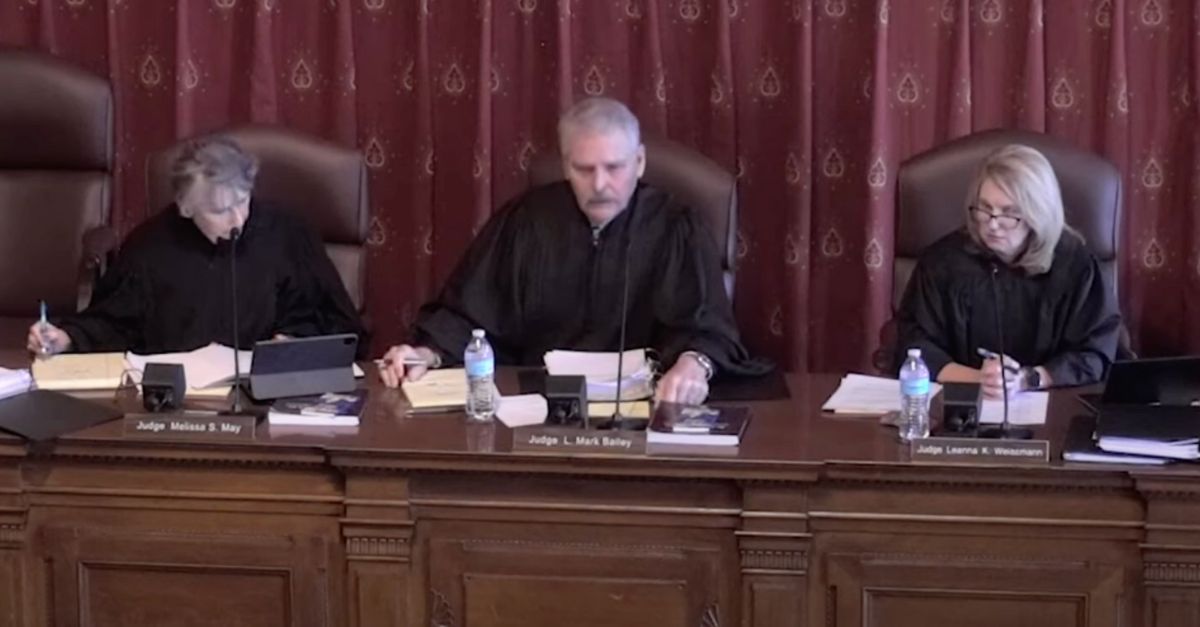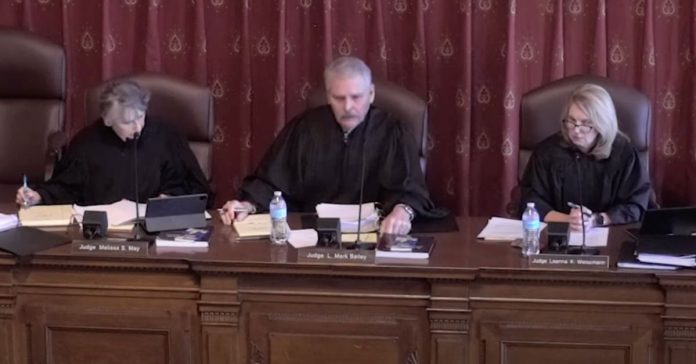
Left to right: Judges of the Indiana Court of Appeals Melissa S. May, L. Mark Bailey, and Leanna K. Weissmann. (Image via WTHR).
The Indiana Court of Appeals issued a bold and unanimous ruling Thursday blocking the state’s near-total abortion ban as a violation of a religious freedom law long championed by conservatives.
The appellate court was unambiguous that the roots of its decision can be found in a framework set up by the U.S. Supreme Court when it overruled Roe v. Wade:
The United States Supreme Court set the stage for this appeal two years ago when it ruled that the federal constitution “does not confer a right to abortion.” In so ruling, the Dobbs Court placed the ability to regulate abortions not protected by federal law squarely in the states’ laps.
Hoosiers after Dobbs
In August 2022, following the Supreme Court’s decision in Dobbs v. Jackson Women’s Health Organization, the Indiana state legislature became the first in the nation to pass a ban on nearly all abortions. Immediately thereafter, the ACLU of Indiana sued to challenge the ban on behalf of five anonymous Jewish, Muslim, and spiritual plaintiffs and the group Hoosier Jews for Choice. The plaintiffs argued that their religious beliefs not only support — but in some situations, even mandate — abortions that would be illegal under Indiana’s ban. The conflict between the Indiana abortion ban and the plaintiffs’ individual religious beliefs meant the ban violated the state’s Religious Freedom Restoration Act (RFRA), they said in their complaint.
Indiana’s RFRA was a controversial piece of legislation signed into law in April 2016 by then-Governor Mike Pence, a Republican. Like other RFRA laws, Indiana’s said that local or state government action “may not substantially burden a person’s right to the exercise of religion” unless that action satisfies a strict-scrutiny test. Conservative champions of the law hailed it as a victory for the free exercise of religion while opponents denounced it as a license to discriminate against the LGBTQ+ community.
In recent years, various state and national rulings have expanded the scope of “religious liberty” to include allowing a Christian web designer to refuse service to LGBTQ+ clients and an evangelical Christian postal worker to refuse Sunday work shifts.
Upon signing Indiana’s RFRA statute into law, Pence said in a statement:
The freedom of religion for every Hoosier is enshrined in the Constitution of the United States and in the Indiana Constitution, which reads, ‘No law shall, in any case whatever, control the free exercise and enjoyment of religious opinions, or interfere with the rights of conscience.’ For generations, these protections have served as a bulwark of religious liberty for Hoosiers and remain a foundation of religious liberty in the State of Indiana, and that will not change.
Now, less than a decade later, the state’s conservative agenda has been turned on its head as the same statute has been used to block Indiana’s restrictive abortion law as a violation of religious liberty.
Pregnancy, sex, and abortions are “religious exercise” too
An Indiana state trial court blocked enforcement of the abortion law via preliminary injunction in December 2022, and Indiana appealed. A unanimous three-judge panel of the Indiana Court of Appeals heard oral arguments on the appeal on Dec. 6, 2023, and on Thursday, upheld the trial court’s injunction.
Over a 76-page ruling, Judge Leanna Weissmann systematically used the state’s own legal arguments against it.
Weissmann said that, “pregnancy, by its very nature, defies simple prediction,” and that the plaintiffs presented enough evidence that their religious beliefs were burdened “in the form of altered sexual and reproductive patterns.”
Specifically, the court found, that due to a fear that they might be unable to obtain an abortion as dictated by their religious beliefs, the plaintiffs “severely decreased their sexual intimacy with their husbands.”
Weissmann laid out the blueprint for the connection between religion and abortion. First, she explained, the U.S. Supreme Court has been clear that the “exercise of religion” includes performance of or abstention from physical acts that are engaged in for religious reasons — including having an abortion.
Moreover, Weissmann also drew upon the Supreme Court’s logic from its 2014 ruling in Burwell v. Hobby Lobby: “If a corporation can engage in a religious exercise by refusing to provide abortifacients — contraceptives that essentially abort a pregnancy after fertilization — it stands to reason that a pregnant person can engage in a religious exercise by pursuing an abortion.”
A spectacular failure of strict scrutiny
Having concluded that terminating a pregnancy is indeed a religious exercise, Weissmann applied the RRFA strict-scrutiny standard to any government burden on that exercise. Under RFRA, the state may only restrict the free exercise of religion if the burden is “essential to further a compelling governmental interest,” and is “the least restrictive means of furthering the compelling governmental interest.” The appellate court said Indiana not only lacked a sufficiently compelling government interest, but that even if its interest were compelling, its abortion ban was clearly not the “least restrictive means” of furthering any goal it may have had.
The court pointed to Indiana’s lack of specificity in lawmaking as proof that it lacks a compelling interest sufficient to ban abortions from the moment of fertilization. Because the legislature has not specifically designated an “exact point during pregnancy when the State’s interest in a zygote, embryo, or fetus becomes compelling,” Indiana cannot satisfy the requirement that it point to a governmental interest sufficient to warrant intrusion on individual religious liberty.
Further, the court said, Indiana already allows for abortions in cases that would pose a fatal risk to a mother. The panel said this proves that banning abortion from the moment of fertilization is not the “least restrictive means” of furthering any state goals. Rather, Weissmann wrote, Indiana’s system of prioritizing maternal health in some situations amounts to “the same sort of prioritization reflected in the Plaintiffs’ religious beliefs, albeit on a different scale.”
Weissmann also called out the logical conflict between Indiana’s incest and rape exceptions and its argument that it has a state interest that begins at fertilization.
“The State does not explain why a victim of rape or incest is entitled to an abortion, but women whose sincere religious beliefs direct an abortion are not,” Weissmann wrote. The court’s analysis at this stage is another way its decision is something of a script-flip. Rape and incest exceptions to abortion bans are typically considered concessions that render an abortion statute less stringent. However, those same exceptions were viewed by the appeals court as a kind of poison pill that proves Indiana simply lacks the necessary interest to intrude on religious freedom from the moment of fertilization.
The appeals court did find that the lower court’s preliminary injunction was overbroad in that it applied to both those with and those without a religious basis for their objection. To correct that error, the court remanded the case to the lower court to narrow its injunction.
An “onerous burden upon women and girls”
Both Judges Melissa S. May and L. Mark Bailey concurred with Weissmann’s opinion, and Bailey issued an additional brief but biting concurrence of his own in which he chastised the legislature for “prefer[ring] one creed over another” by outlawing abortion.
“Indeed, where theologians cannot agree, legislators are ill-equipped to define when life begins,” Bailey wrote.
“In a more perfect world, each pregnant woman in evaluating her options would have no burden beyond examining her individual conscience, counseling with her spiritual adviser, and consulting with her medical provider,” Bailey lamented. “But a perfect world this is not and resulting pregnancy is not always a simple free will contract or agreement.”
Bailey, the only male judge on the panel, continued at length, raising the issues of domestic abuse, human trafficking, poverty, medical complications, and more. He concluded with a reminder that the Indiana lawmakers responsible for the abortion ban are disproportionately men.
He wrote:
Legislators, an overwhelming majority of whom have not experienced childbirth, nevertheless dictate that virtually all pregnancies in this State must proceed to birth notwithstanding the onerous burden upon women and girls. They have done so not based upon science or viability but upon a blanket assertion that they are the protectors of “life” from the moment of conception.
In 2022, 26.7% of the Indiana General Assembly members were women, as compared with 50.4% of Indiana’s total population at the time.
Have a tip we should know? [email protected]

